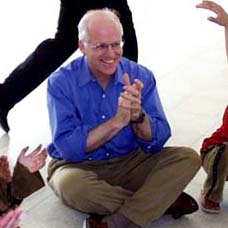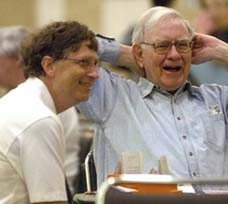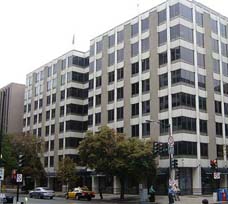2006.08.08: August 8, 2006: Headlines: COS - Mali: Development: Speaking Out: International Herald Tribune : Mali RPCV William G. Moseley writes: The demise of development
Peace Corps Online:
Peace Corps News:
Peace Corps Library:
Development:
January 23, 2005: Index: PCOL Exclusive: Development :
2006.08.08: August 8, 2006: Headlines: COS - Mali: Development: Speaking Out: International Herald Tribune : Mali RPCV William G. Moseley writes: The demise of development
Mali RPCV William G. Moseley writes: The demise of development

The United States was once a leader in international-development thinking. In fact, the United States arguably pioneered the concept with its ground- breaking Marshall Plan for the reconstruction of Europe following World War II. The United States was among the first countries to recognize a string of newly independent African nations during the Kennedy administration in the early 1960s. We not only set up embassies in these countries, but we established development programs in many instances. While all of these programs were initiated to further the aims of the U.S. government during the Cold War, they were notable because of their long-term vision. This vision was quite simple: U.S. interests are best served through development and poverty alleviation in other parts of the world.
Mali RPCV William G. Moseley writes: The demise of development
America's lost vision: The demise of development
William G. Moseley International Herald Tribune
Published: August 8, 2006
ST. PAUL, Minnesota America's lost vision
International development assistance - the idea of making the world a better place to live for everyone - as an effective U.S. policy initiative died some time in the last 10 years. It was killed by a preoccupation with national security and short-term interests and an increasingly narrow, neoliberal economic view of the world.
The United States was once a leader in international-development thinking. In fact, the United States arguably pioneered the concept with its ground- breaking Marshall Plan for the reconstruction of Europe following World War II. The United States was among the first countries to recognize a string of newly independent African nations during the Kennedy administration in the early 1960s. We not only set up embassies in these countries, but we established development programs in many instances.
The Peace Corps was created during this period. This volunteer program sent our best and brightest overseas to foster grass-roots development and peer-to-peer cultural exchanges.
While all of these programs were initiated to further the aims of the U.S. government during the Cold War, they were notable because of their long-term vision. This vision was quite simple: U.S. interests are best served through development and poverty alleviation in other parts of the world.
International development assistance has undergone a striking shift since the Clinton administration, and changed even more dramatically under President George W. Bush.
The foreign assistance arm of the U.S. government, the United States Agency for International Development, increasingly has been politicized, gutted of expertise and made subservient to short- term U.S. foreign policy interests.
USAID has dramatically reduced the its number of experts operating overseas and increasingly centralized its development policy in Washington. Furthermore, the agency is now more directly under the control of the State Department. Sadly, development is increasingly seen, and myopically used, as an extension of U.S. national security strategy.
Development used to be an exciting field of study in American universities and colleges, with several research centers and graduate programs receiving generous government support. The result was a healthy exchange of expertise between government foreign-assistance programs (USAID, Peace Corps, Food for Peace) and academic researchers.
While development studies continues as a field in U.S. universities, it is losing ground to its counterparts in Britain, Canada and Australia - just to name a few. The free flow of ideas between government and academia has been all but shut down. USAID's vision of development is now narrowly conceived of as economic growth, with considerable attention given to free trade and open markets. Outside expertise is sought from only a handful of consulting firms in Washington that share the administration's free-market ideology.
As a teacher, I find that my students are increasingly cynical about the concept of development. They express doubts about America's ability to make the world a better place. They question, rightly so, whether development is not just a tool to impose U.S. hegemony. As the United States falters abroad, and our development efforts become distorted by shorter-term political objectives, many students thus prefer to focus their intellectual energies on local problems.
While we should always work on improving the situation at home, a rapidly globalizing economy means that we must have informed students - who are our future leaders - willing to work for a better world in the international arena.
The Bush administration is clearly better at waging war than building stable economies. We must return to a long-term vision in which sustainable and equitable development is seen as the bedrock of a stable world system. In order to do this, USAID and related government agencies must be given the latitude to pursue development for development's sake. We should also reopen the exchange of ideas between government and academics on these important programs.
William G. Moseley is assistant professor of geography at Macalester College in Saint Paul, Minnesota. He is author, most recently, of "Taking Sides: Clashing Views on African Issues."
When this story was posted in September 2006, this was on the front page of PCOL:





Peace Corps Online The Independent News Forum serving Returned Peace Corps Volunteers
 | Chris Shays Shifts to Favor an Iraq Timetable
In a policy shift, RPCV Congressman Chris Shays, long a staunch advocate of the Bush administration's position in Iraq, is now proposing a timetable for a withdrawal of American troops. How Mr. Shays came to this change of heart is, he says, a matter of a newfound substantive belief that Iraqis need to be prodded into taking greater control of their own destiny under the country’s newly formed government. As Chairman of the House Government Reform subcommittee on national security, he plans to draft a timetable for a phased withdrawal and then push for its adoption. A conscientious objector during the Vietnam War who said that if drafted he would not serve, Chris Shays has made 14 trips to Iraq and was the first Congressman to enter the country after the war - against the wishes of the Department of Defense. |
 | Peace Corps' Screening and Medical Clearance
The purpose of Peace Corps' screening and medical clearance process is to ensure safe accommodation for applicants and minimize undue risk exposure for volunteers to allow PCVS to complete their service without compromising their entry health status. To further these goals, PCOL has obtained a copy of the Peace Corps Screening Guidelines Manual through the Freedom of Information Act (FOIA) and has posted it in the "Peace Corps Library." Applicants and Medical Professionals (especially those who have already served as volunteers) are urged to review the guidelines and leave their comments and suggestions. Then read the story of one RPCV's journey through medical screening and his suggestions for changes to the process. |
 | Gates charity races to spend billions
Warren E. Buffett’s gift of $31 billion to the Bill and Melinda Gates Foundation means that for tax reasons, starting in 2009, the foundation must distribute $3 billion annually, or a little more than twice what it distributed last year.
PCOL Comment: The Foundation says that "preventing the spread of HIV is the most durable long-term solution to the AIDS epidemic, and a top priority for the foundation." Peace Corps Volunteers and Returned Volunteers have been doing just that in AIDS Education for the past 15 years. Why not consider a $100M annual contribution to the Peace Corps to put 2,500 additional volunteers in the field to expand AIDS education worldwide? |
 | The Peace Corps is "fashionable" again
The LA Times says that "the Peace Corps is booming again and "It's hard to know exactly what's behind the resurgence." PCOL Comment: Since the founding of the Peace Corps 45 years ago, Americans have answered Kennedy's call: "Ask not what your country can do for you--ask what you can do for your country. My fellow citizens of the world: ask not what America will do for you, but what together we can do for the freedom of man." Over 182,000 have served. Another 200,000 have applied and been unable to serve because of lack of Congressional funding. The Peace Corps has never gone out of fashion. It's Congress that hasn't been keeping pace. |
 | Changing the Face of Hunger
In his new book, Former Congressman Tony Hall (RPCV Thailand) says humanitarian aid is the most potent weapon the United States can deploy against terrorism. An evangelical Christian, he is a big believer in faith-based organizations in the fight against hunger. Members of Congress have recently recommended that Hall be appointed special envoy to Sudan to focus on ending the genocide in Darfur. |
 | PC will not return to East Timor in 2006
Volunteers serving in East Timor have safely left the country as a result of the recent civil unrest and government instability. Latest: The Peace Corps has informed us that at this time, the Peace Corps has no plans to re-enter the country in 2006. The Peace Corps recently sent a letter offering eligible volunteers the opportunity to reinstate their service in another country. |
 | Chris Dodd considers run for the White House
Senator Chris Dodd plans to spend the next six to eight months raising money and reaching out to Democrats around the country to gauge his viability as a candidate. Just how far Dodd can go depends largely on his ability to reach Democrats looking for an alternative to Hillary Clinton. PCOL Comment: Dodd served as a Volunteer in the Dominican Republic and has been one of the strongest supporters of the Peace Corps in Congress. |
 | Peace Corps stonewalls on FOIA request
The Ashland Daily Tidings reports that Peace Corps has blocked their request for information on the Volkart case. "After the Tidings requested information pertaining to why Volkart was denied the position — on March 2 — the newspaper received a letter from the Peace Corps FOIA officer stating the requested information was protected under an exemption of the act." The Dayton Daily News had similar problems with FOIA requests for their award winning series on Volunteer Safety and Security. |
 | PCOL readership increases 100%
Monthly readership on "Peace Corps Online" has increased in the past twelve months to 350,000 visitors - over eleven thousand every day - a 100% increase since this time last year. Thanks again, RPCVs and Friends of the Peace Corps, for making PCOL your source of information for the Peace Corps community. And thanks for supporting the Peace Corps Library and History of the Peace Corps. Stay tuned, the best is yet to come. |
 | History of the Peace Corps
PCOL is proud to announce that Phase One of the "History of the Peace Corps" is now available online. This installment includes over 5,000 pages of primary source documents from the archives of the Peace Corps including every issue of "Peace Corps News," "Peace Corps Times," "Peace Corps Volunteer," "Action Update," and every annual report of the Peace Corps to Congress since 1961. "Ask Not" is an ongoing project. Read how you can help. |
 | RPCV admits to abuse while in Peace Corps
Timothy Ronald Obert has pleaded guilty to sexually abusing a minor in Costa Rica while serving there as a Peace Corps volunteer. "The Peace Corps has a zero tolerance policy for misconduct that violates the law or standards of conduct established by the Peace Corps," said Peace Corps Director Gaddi H. Vasquez. Could inadequate screening have been partly to blame? Mr. Obert's resume, which he had submitted to the Peace Corps in support of his application to become a Peace Corps Volunteer, showed that he had repeatedly sought and obtained positions working with underprivileged children. Read what RPCVs have to say about this case. |
 | Why blurring the lines puts PCVs in danger
When the National Call to Service legislation was amended to include Peace Corps in December of 2002, this country had not yet invaded Iraq and was not in prolonged military engagement in the Middle East, as it is now. Read the story of how one volunteer spent three years in captivity from 1976 to 1980 as the hostage of a insurrection group in Colombia in Joanne Marie Roll's op-ed on why this legislation may put soldier/PCVs in the same kind of danger. Latest: Read the ongoing dialog on the subject. |
Read the stories and leave your comments.

Some postings on Peace Corps Online are provided to the individual members of this group without permission of the copyright owner for the non-profit purposes of criticism, comment, education, scholarship, and research under the "Fair Use" provisions of U.S. Government copyright laws and they may not be distributed further without permission of the copyright owner. Peace Corps Online does not vouch for the accuracy of the content of the postings, which is the sole responsibility of the copyright holder.
Story Source: International Herald Tribune
This story has been posted in the following forums: : Headlines; COS - Mali; Development; Speaking Out
PCOL34011
01























